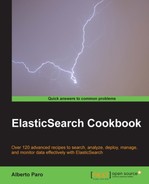In the previous recipes, we have seen the has_child query. ElasticSearch provides a query to search a child based on the has_parent parent query.
You need a working ElasticSearch cluster and the data populated with the populate script.
For executing the has_parent query/filter, we need to perform the following steps:
- We want to search the
test-type2children of which thetest-typeparents have a termjoein theparsedtextfield. We can create this kind of query as follows:curl -XPOST 'http://127.0.0.1:9200/test-index/test-type2/_search' -d '{ "query": { "has_parent" : { "type" : "test-type", "query" : { "term" : { "parsedtext" : "joe" } } } } } }' - If scoring is not important, it's better to reformulate the query as a filter in the following way:
curl -XPOST 'http://127.0.0.1:9200/test-index/test-type2/_search' -d '{ "query": { "filtered": { "filter": { "has_parent" : { "type" : "test-type", "query" : { "term" : { "parsedtext" : "joe" } } } }, "query": { "match_all": {} } } } }'
This kind of query works returning children that match a parent query.
Internally this subquery is executed on the parents and all the IDs of the matching parents are used to filter the children. A system must have enough memory to store parent IDs.
The parameters that are used to control this process are as follows:
type: This parameter defines the type of the parent.query: This parameter defines the query that can be executed for selecting the parents. Every kind of query can be used.score_type(defaultnone, available values arenoneandscore): By using the default configuration ofnone, ElasticSearch ignores the scores for the parent document reducing the memory usage and increasing performance. If it's set to score, the parent query score is aggregated into the children.
- Refer to Indexing a document in Chapter 4, Standard Operations
..................Content has been hidden....................
You can't read the all page of ebook, please click here login for view all page.
